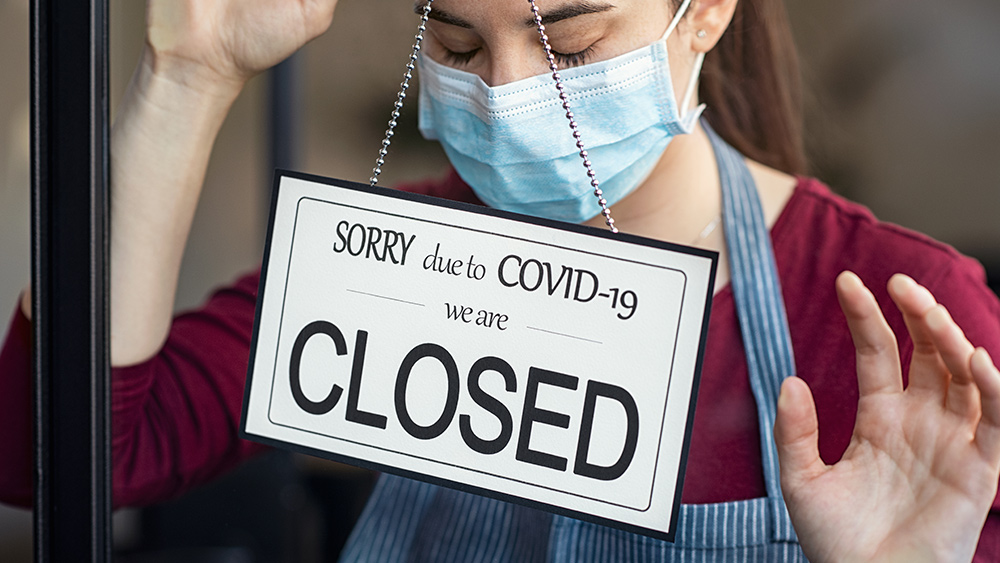Germany keeps lockdown in place even as the government receives intense criticism from business organizations
02/21/2021 / By Arsenio Toledo

German businesses and trade organizations are strongly criticizing the government of Chancellor Angela Merkel its decision to extend the country’s Wuhan coronavirus (COVID-19) lockdown, despite the objections from the country’s private sector.
“Businesses are growing increasingly desperate and angry,” said Guido Zollick, head of the German Hotel and Restaurant Association. “More and more fear for their existence.”
Zollick spoke after he and other business leaders from 40 groups representing Germany’s hospitality, tourism, retail and other industries met with Minister of the Economy Peter Altmaier for a “crisis meeting.”
During this meeting, the business leaders strongly criticized Merkel’s government for its “go-slow” approach to reopening the economy.
The business representatives directed their anger at a recent meeting the chancellor had with the heads of Germany’s 16 states. These politicians expressed their concerns regarding the supposed spread of new, more aggressive strains of the coronavirus, and decided that the country’s lockdown needed to be extended until March 7.
While doctors and other representatives of public health organizations greeted the extension of the lockdown warmly, the business community was not as welcoming.
Germany’s leaders also decided that non-essential businesses will only be allowed to resume full operations if the area’s one-week incidence rate does not exceed 35 for at least three consecutive days.
Meanwhile, the politicians have not crafted a plan to reopen hotels, restaurants or any other leisure facilities.

The business summit hosted by Altmaier was a chance for many of Germany’s most prominent business leaders and associations to air their grievances regarding the extension of the lockdown. It also gave them the chance to find a resolution that would be acceptable for both the government and the private sector.
Josef Sanktjohanser, head of the German Retail Federation, the leading association for businesses in the retail sector, said the summit just left more of his members “deeply disappointed.”
“There’s no appropriate reason to stop retail outlets reopening above an incidence rate of 35,” said Sanktjohanser.
“From our point of view, after the long lockdown phase, the measures are neither differentiated, appropriate nor proportionate. In addition to the lack of opening perspectives, many retailers despair that the aid will pass them by.”
According to Sanktjohanser, if the government does not provide more aid to businesses, as much as 65 percent of shops in German city centers might file for insolvency by year end.
While the lockdown will remain in place, Altmaier did announce some concessions. He promised to work with the private sector in crafting a more business-friendly “reopening strategy” in time for Merkel’s next scheduled meeting with the leaders of Germany’s 16 states on March 3.
Altmaier also announced that the government has decided to lift the cap excluding companies with annual sales exceeding 750 million euros ($903.2 million) from applying for government aid.
Despite these concessions, Altmaier said that, when the government meets to consider further relaxing restrictions on economic activity, they will be putting the needs of the private sector in the backseat.
“The economy can’t flourish if we get a third wave of infections,” he said during a television interview ahead of his crisis meeting.
Germans dealing with one of the harshest lockdowns in all of Europe
According to data published by the Institute for Economic Research, one of Germany’s leading economic think tanks, the country’s economy contracted by 6.6 percent in 2020. The Federal Statistics Office also announced that the number of jobs in the German manufacturing industry fell by 2.2 percent, the first time jobs in that sector decreased since 2010.
Despite the economy shrinking, the German government is not budging with its decision to keep some of the harshest lockdown measures in all of Europe in place. (Report: States that imposed lockdown have more COVID-19 deaths per million compared to no-lockdown states.)
The lockdown is causing widespread discontent among the private sector. Not only that, but businesses are also frustrated with delays in the distribution of government aid.
According to Michael Frenzel, leader of the Federal Association of the German Tourism Industry, around a quarter of aid payments that were supposed to arrive in November still haven’t been doled out. Another 75 percent of government aid meant to be given in December has yet to be distributed.
The extension of the lockdown is also threatening the government politically. Currently, Merkel’s conservative Christian Democratic Union (CDU) is leading the German parliament in a coalition with the conservative Christian Social Union and the leftist Social Democratic Party.
This “grand coalition” has been enjoying high approval ratings, but voters are becoming impatient with the length of the lockdown. With seven months to go before the election, the CDU’s polling numbers are showing signs of decreasing, according to the latest poll.
There’s already growing dissent within Merkel’s own party, with CDU Chairperson Armin Laschet – one of the leading contenders to replace Merkel as the party’s candidate for chancellor – criticizing her for becoming too dependent on the incidence rate.
“You can’t keep inventing new limits” that prevent people from returning to normal life, he said during an event with party members.
If Merkel continues to refuse to listen to business groups, and even from the members of her own party, the CDU may just well lose its mandate to govern to a party that is more willing to listen to the needs of the private sector.
Learn more about how countries in Europe like Germany and France are dealing with the coronavirus by reading the latest articles at Pandemic.news.
Sources include:
Tagged Under: Angela Merkel, coronavirus, coronavirus lockdown, coronavirus restrictions, covid-19, economic collapse, economic restrictions, economy, Flu, Germany, government, infections, lockdown, lockdowns, outbreak, pandemic, virus




















